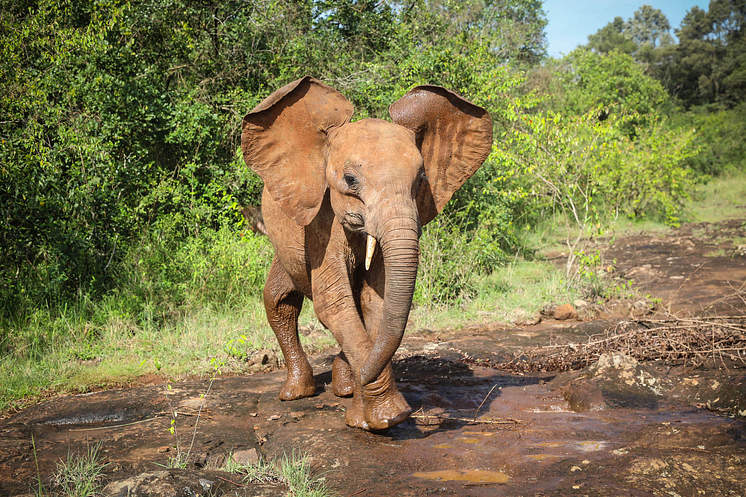Barely into the New Year, we received reports of a lone calf on El Karama Ranch in Laikipia. He was about three years of age, far too young to be on his own. His back legs appeared to be severely bow-legged, which hindered his mobility and added a further element of concern to his situation.
Our SWT/KWS Mount Kenya Mobile Veterinary Unit arrived on the scene to assess the calf. After darting him, they carefully inspected his hind legs and concluded that his condition was a birth defect and didn’t require further treatment. Given that he was a bit older, the decision was made to release him, in the hopes that he would be scooped up by a passing herd.
After a few weeks, however, it became clear that no reunions were in the calf’s future. He was living a lonely life, largely ignored by passing elephants and increasingly vulnerable to predators. Once it was abundantly clear that he was indeed an orphan, KWS determined that he would be rescued and brought into our care.
The calf was too big to be transported to the Nursery by air, so we set the wheels in motion for a ground operation. Our elephant moving truck made the long drive north to Nanyuki and then beyond to El Karama Ranch, where our team overnighted to prepare for a morning rescue.
While we were in position bright and early on the morning of 1st February, the calf was nowhere to be found. Our teams and El Karama staff embarked on an extensive search through the bush, but he had vanished. Just as we feared the worst — that he had fallen victim to lions or perhaps hyenas — he was found holed up deep in a thicket.
Everyone breathed a collective sigh of relief to locate the young calf. He was promptly darted and, once asleep, transported into the truck. He awoke to find himself ensconced in his compartment, surrounded by a thick layer of hay and soft mattresses. The vet team and our experienced Keepers monitored him throughout the journey, but he remained remarkably relaxed. It was slow going to Nairobi and the convoy didn’t pull into the Nursery until nine o’clock that night.
Given his size, it took a number of men to usher him into his stockade. He was stabled next door to Kiasa, who was extremely concerned about her new neighbour. She made it her mission to make him feel at ease, taking up position at their shared partition and extending a welcoming trunk. Her presence had a calming effect on the calf, and by morning he was drinking milk from a bottle and suckling on his Keepers’ fingers.
These rescues are always the most poignant: Calves who have been alone for so long that they are visibly grateful to be rescued. He was delighted to be amongst a new family and lavished love on everyone he met, Keepers and fellow orphans alike. We named him Rama, a nod to El Karama Ranch, the place of his birth.
While Rama was relieved to close the chapter on his lonely ordeal, the battle to save his life was just beginning. He was riddled with worms, so we had to carefully treat him while also tending to his fragile health. His first days with us were touch-and-go, as he collapsed frequently and required all hands on deck to revive him with IV drips. Fortunately, his condition improved enormously once he was free of parasites, and the quantity of worms that were expelled from his body was truly astonishing.
For those rescued who are as starved for company as Rama, it is important to get them out with the other orphans as soon as possible. So, the moment he was strong enough, he had his first foray into the forest. We kept him with the smaller orphans, allowing him to get a taste of the routine while remaining closer to home. Everyone was very ecstatic to have a new friend in their midst and immediately clustered around him, jockeying for time with the new arrival.
Despite all his improvements, Rama’s mysterious ailments continued. Fortunately, his bow legs don’t affect him as much as we initially feared. They do lend him a unique appearance and gait, but he is able to move fairly well, particularly now that his strength is returning. However, rather disconcertingly, he seemed to have very poor vision. It continued to deteriorate, until he completely lacked sight. We called in a specialist who reported that his eyes were in perfect working order, so it must be due to other neurological factors. Interestingly, he never seemed remotely fazed by his deteriorating vision and just went about his days as normal, responding to scent and sound. Things are looking up for Rama, however, and while he doesn’t yet have full eyesight, it is coming back day by day.
Rama is a remarkable calf. He has overcome formidable circumstances with a lionhearted spirit, reminding us of Luggard in many ways. Everyone who meets Rama, human or elephant, is instantly enchanted as he is just so happy to be alive and surrounded by loved ones, and that sunny outlook rubs off on all who are in his orbit. We can only imagine how scared he must have been for all those weeks on his own, but Rama is a survivor — and now, he will never be alone again.




















